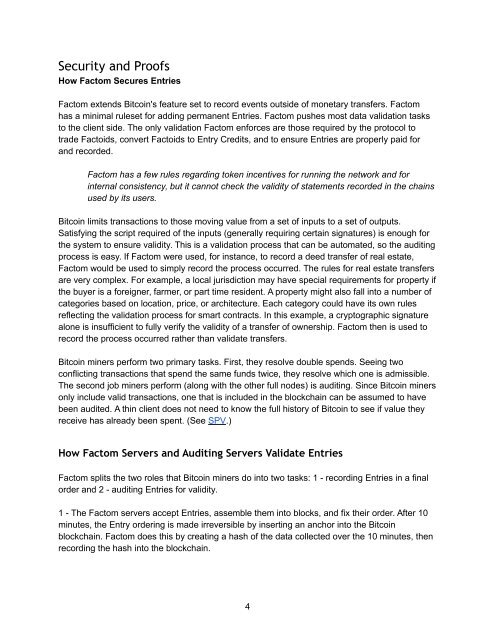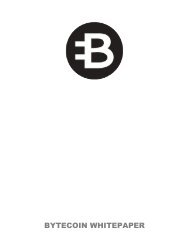Whitepaper - Factom With Cover
Create successful ePaper yourself
Turn your PDF publications into a flip-book with our unique Google optimized e-Paper software.
Security and Proofs<br />
How <strong>Factom</strong> Secures Entries<br />
<strong>Factom</strong> extends Bitcoin's feature set to record events outside of monetary transfers. <strong>Factom</strong><br />
has a minimal ruleset for adding permanent Entries. <strong>Factom</strong> pushes most data validation tasks<br />
to the client side. The only validation <strong>Factom</strong> enforces are those required by the protocol to<br />
trade Factoids, convert Factoids to Entry Credits, and to ensure Entries are properly paid for<br />
and recorded.<br />
<strong>Factom</strong> has a few rules regarding token incentives for running the network and for<br />
internal consistency, but it cannot check the validity of statements recorded in the chains<br />
used by its users.<br />
Bitcoin limits transactions to those moving value from a set of inputs to a set of outputs.<br />
Satisfying the script required of the inputs (generally requiring certain signatures) is enough for<br />
the system to ensure validity. This is a validation process that can be automated, so the auditing<br />
process is easy. If <strong>Factom</strong> were used, for instance, to record a deed transfer of real estate,<br />
<strong>Factom</strong> would be used to simply record the process occurred. The rules for real estate transfers<br />
are very complex. For example, a local jurisdiction may have special requirements for property if<br />
the buyer is a foreigner, farmer, or part time resident. A property might also fall into a number of<br />
categories based on location, price, or architecture. Each category could have its own rules<br />
reflecting the validation process for smart contracts. In this example, a cryptographic signature<br />
alone is insufficient to fully verify the validity of a transfer of ownership. <strong>Factom</strong> then is used to<br />
record the process occurred rather than validate transfers.<br />
Bitcoin miners perform two primary tasks. First, they resolve double spends. Seeing two<br />
conflicting transactions that spend the same funds twice, they resolve which one is admissible.<br />
The second job miners perform (along with the other full nodes) is auditing. Since Bitcoin miners<br />
only include valid transactions, one that is included in the blockchain can be assumed to have<br />
been audited. A thin client does not need to know the full history of Bitcoin to see if value they<br />
receive has already been spent. (See SPV.)<br />
How <strong>Factom</strong> Servers and Auditing Servers Validate Entries<br />
<strong>Factom</strong> splits the two roles that Bitcoin miners do into two tasks: 1 - recording Entries in a final<br />
order and 2 - auditing Entries for validity.<br />
1 - The <strong>Factom</strong> servers accept Entries, assemble them into blocks, and fix their order. After 10<br />
minutes, the Entry ordering is made irreversible by inserting an anchor into the Bitcoin<br />
blockchain. <strong>Factom</strong> does this by creating a hash of the data collected over the 10 minutes, then<br />
recording the hash into the blockchain.<br />
4
















